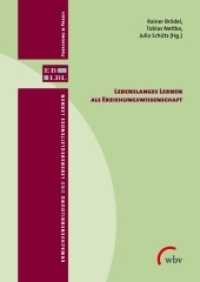- ホーム
- > 洋書
- > 英文書
- > Politics / International Relations
基本説明
This anthology critically re-examines the discursive boundary that binds the region called East Asia in order to produce Trans-Pacific studies.
Full Description
This anthology critically re-examines and re-articulates the discursive boundary that binds the region called East Asia in order to produce Trans-Pacific Studies. Recognizing that the creation of regional boundaries depends on a new configuration of both inter- and intra-national power relations and the ideological constructs that generate historical, ideological, and cultural effects, this volume proposes that the term "trans-Pacific" be mobilized to complicate the phrase "East Asian" as the boundary of academic discipline and socio-cultural discourse. The anthology also examines the historical conditions under which "East Asia" was constructed as an area and the trans-Pacific directives that nurtured the sense of nationality in each component nation of East Asia.With the contribution of: Sun Ge (The Institute of Literature, Chinese Academy of Social Sciences); Soyoung Kim (Korean National University of Arts); Hyoduk Lee (Tokyo University of Foreign Studies); Jie-Hyun Lim (Hanyang University); Lisa Lowe (University of California); Tessa Morris-Suzuki (The Australian National University); Naoki Sakai (Cornell University), Yuko Shibata (Saint John's University); Annmaria Shimabuku (University of California); Ikuo Shinjou (University of the Ryukyus); Hyon Joo Yoo (University of Vermont).
Contents
Introduction; National Ontology and the New Asian Immigrant in US Empire after September 11; Trans-Pacific Studies and US - Japan Complicity; Re-Imagining the Space of East Asia - from Empire to Cold War and Beyond; The Political Formation of the Homoerotics and the Cold War: Battle of the Gazes at and from Okinawa; Transnationality of the Victimhood Nationalism; Making Sense of East Asia: From China's Point of View; East Asia as an Objective of an Intellectual History; Securing Okinawa for Miscegenation: A Biopolitical Reading of Nagado Eikichi's "Tent Village of Garama"; Postcolonial Hiroshima, Mon Amour: Franco-Japanese Collaboration in the American Shadow; Postcolonial Film Historiography in Taiwan and South Korea: The Puppet Master and Chihwaseon; The Incurable Feminine of Women without a Country in East Asian Cinema.








